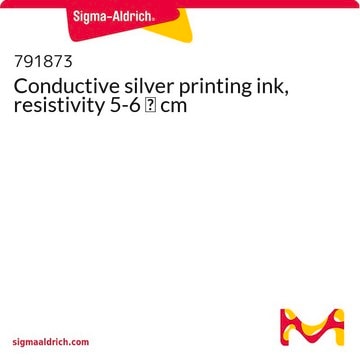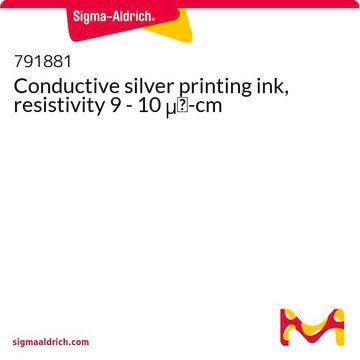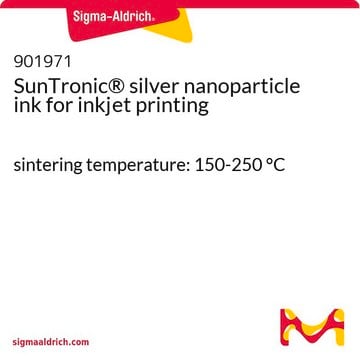901769
Flexible conductive silver paste for screen printing
Sinonimo/i:
Ag ink, C2080415P2, Conductive ink, Silver ink
About This Item
Prodotti consigliati
Descrizione
Coverage: 250-270 cm2 per g (using a 230 mesh stainless steel screen)
Flash point: 90°C
Solid content: 44-46% (at 130°C)
Volume resistivity: 925 ohm cm at 60°C
527 ohm cm at 130°C
Forma fisica
paste
Durezza
5B (pencil hardness)
Viscosità
0.72-1.78 Pa.s (Haake RS1 C20/2° TiL at 230 sec-1 at 25°C)
Categorie correlate
Descrizione generale
The ink has undergone electrical and mechanical testing which has shown that it is very flexible.
Applicazioni
- Screen-printable silver paste material for semitransparent and flexible metal–semiconductor–metal photodetectors with liquid-phase procedure: This study presents a flexible MSM photodetector using conductive Ag paste electrodes made through a screen-printing liquid-phase process, offering insights into the semitransparency of Ag paste solutions (Tsai et al., 2022).
- Effect of polymer binder on the transparent conducting electrodes on stretchable film fabricated by screen printing of silver paste: This research examines the role of polymer binders in silver pastes used on flexible polyurethane and polyester films, focusing on rheological properties (Lim et al., 2017).
- Deposition of high conductivity low silver content materials by screen printing: Investigates novel polymer inks alongside traditional paste materials for their application in both rigid and flexible circuit printing, emphasizing cost-effectiveness and performance (Jewell et al., 2015).
- Printability of the screen-printed strain sensor with carbon black/silver paste for sensitive wearable electronics: Explores the use of carbon black/Ag nanocomposites in pastes for flexible printed electronic products, enhancing the sensitivity and flexibility of these devices (Qi et al., 2020).
- High-concentration copper nanoparticles synthesis process for screen-printing conductive paste on flexible substrate: While focusing on copper, this study provides relevant comparisons to silver pastes, detailing formulations suitable for screen-printing on flexible polyester substrates (Tam and Ng, 2015).
Caratteristiche e vantaggi
Low silver content paste presenting low resistivity, good flexibility and good adhesion on the mentioned substrates
Proprietà fisiche
Sheet resistivity: 15-20mΩ/square at 25μm
30-45mΩ/square at 10μm
Bending test: ink survived 3 cycles
(Substrate is creased and bent internally and externally with a 2kg weight.
The test piece has failed when the resistance reaches 10 times the initial value.)
Double curing: aging factor of -0.7%after double curing at 150°C for 15min
How water test: aging factor of -0.2% after boiling for 1hour
Nota sulla preparazione
Please mix well the paste without introducing air bubbles prior to screen printing.
Screen Printing Equipment: semi-automatic, manual
Ink Screen Life: >3 hours
Screen Types: suitable for use with polyester or stainless steel meshes in the range of 156 to 325 tpi.
Typical Drying Conditions: Dry at 130°C - 150°C for 10-30 minutes or on a belt dryer with air flow that sees 130°C-170°C for 5-10 minutes.
Clean Up Solvent: ethoxy propanol or sericol
Substrate: polyimide, PET, PEN and can also be printed on more rigid substrates such as alumina
Note legali
Avvertenze
Warning
Indicazioni di pericolo
Consigli di prudenza
Classi di pericolo
Aquatic Acute 1 - Aquatic Chronic 1
Codice della classe di stoccaggio
10 - Combustible liquids
Classe di pericolosità dell'acqua (WGK)
WGK 3
Punto d’infiammabilità (°F)
194.0 °F
Punto d’infiammabilità (°C)
90 °C
Certificati d'analisi (COA)
Cerca il Certificati d'analisi (COA) digitando il numero di lotto/batch corrispondente. I numeri di lotto o di batch sono stampati sull'etichetta dei prodotti dopo la parola ‘Lotto’ o ‘Batch’.
Possiedi già questo prodotto?
I documenti relativi ai prodotti acquistati recentemente sono disponibili nell’Archivio dei documenti.
I clienti hanno visto anche
Articoli
Small molecular weight organic semiconductors are promising for flexible transistor applications in next-gen soft electronics.
Professors Tokito and Takeda share design principles and optimization protocols for organic electronic devices, focusing on flexibility and low cost.
Il team dei nostri ricercatori vanta grande esperienza in tutte le aree della ricerca quali Life Science, scienza dei materiali, sintesi chimica, cromatografia, discipline analitiche, ecc..
Contatta l'Assistenza Tecnica.







![[6,6]-Phenyl C61 butyric acid methyl ester >99.5%](/deepweb/assets/sigmaaldrich/product/structures/359/221/d990c746-0960-4c69-bf76-fe09b193824d/640/d990c746-0960-4c69-bf76-fe09b193824d.png)



